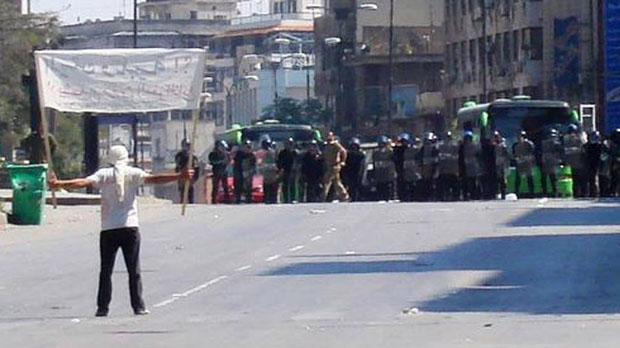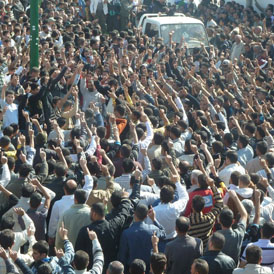Syria ‘spilling over into sectarian violence’
As more than 11 people are reportedly killed across Syria in defiance of the Arab League peace plan, a human rights group warns Channel 4 News of sectarian violence in Homs.

The continued violence comes on the first Friday since the Syrian regime struck a deal with the Arab League to stop violence against demonstrators, remove tanks and armoured vehicles from the streets, and release political prisoners.
The activist group, the LCC, said that five civilians had been killed in Homs by heavy shooting and sniper fire in the Bab Amro district, a day after 20 civilians reportedly died in the city.
“The Syrian army are continuing to shell and launch attacks in Bab Amro,” Hozan Ibrahim, from the LCC, told Channel 4 News, adding that he had heard reports of “minor” sectarian clashes in Homs.
Armed groups
Syrian state television said the government was offering an amnesty to armed insurgents who turned themselves in.
“The interior ministry calls on citizens who carried weapons, sold them, delivered them, transported them or funded buying them, and did not commit crimes, to hand themselves into the nearest police station,” state television said on Friday.
Although the Syrian regime has repeatedly claimed that deaths in the country are the work of “armed gangs and terrorists”, Wissam Tariff of the campaign group Avaaz, believes that it is only recently that small “militarised vigilante groups” have emerged, notably in Homs, which lies near the border with Lebanon.
He told Channel 4 News that, in Homs at least, there was a small but growing number of reprisal killings after tension between members of the Sunni majority and Alawite minority, the sect President Assad and most of the ruling class belong to.
“In the last 72 hours we know a bus full of seven Sunni activists were kidnapped and killed, in return nine Alawites were later killed. Then, in Howla on the outskirts of Homs, 13 Sunni factory workers were killed by Alawites.
“Yesterday we heard about Alawite and Sunni bodies all over Homs. We don’t know what is going on right now in Bab Amro, which has been cut off.”
The President of the Syrian Observatory for Human Rights, Walid Saffour, who used to work in the Howla district, told Channel 4 News he had heard the same reports about the three incidents.
But he had also been told by his sources the alleged Alawite ‘vigilantes’ may have been members of the pro-regime militia the Shabhiha.
Both the Amnesty International and Human Rights Watch teams in Lebanon were unavailable to comment.
Read more: Inside Syria’s dungeons

A ‘new strategy’
Mr Tariff said it was unlikely the groups were aligned to the protest movement or to the Syrian government. But he believed violence was being indirectly encouraged by the Syrian government.
“I think weapons from Lebanon could only have got to the Sunni groups with the knowledge of the authorities, and we know that Alawite areas have been flooded and encouraged to fight for some time.
“People are fed up of getting killed and shot, they have ceased to believe their will be intervention, so they are now engaged in vendetta. But this is suicide, it is madness, there is no political will for it whatsoever,” Mr Tariff said.
The Syrian authorities have said they are acting to prevent weapons being smuggled over the Lebanese border.
Read more: Is Syria sliding into civil war?
Political Will
Abdulbasit Sayda, a member of the opposition coalition group the Syrian National Council (SNC) who is based in Turkey, expressed his “unanimous condemnation” at sectarian killings and urged restraint on all sides.
“We have a complicated situation in that we have a country of Sunnis, Christians, Alawites, Shia, and Kurds,” Mr Sayda told Channel 4 News
“The regime are trying to show that the problem is between Sunni and Alawite, they are trying to show it is like Iraq, but in reality the people are united,” Mr Sayda continued.
He said that the Arab League plan was a “step in the right direction,” but urged President Assad “to keep his word.”
“Assad promised he would talk to us within two weeks, we await that with open ears. He promised to stop the killing, but we have not seen that. It is clear to me that he is buying time.
“We will continue supporting peaceful protests until however long it takes.”
A long road to peace
Oliver Miles, the former UK ambassador to Libya, welcomed the Arab League plan but expected there to be a long road to peace.
“Frankly I wouldn’t expect the peace initiative to work immediately, ceasefires often break down and it takes several goes,” he told Channel 4 News.
He said foreign governments should be “very cautious” of intervention in Syria, citing sectarian, legal, and military problems.
